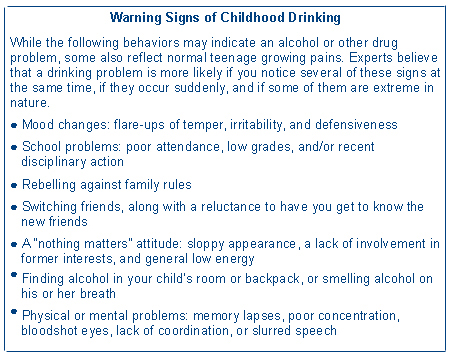Health Promotion
Whatever your role as educator — teacher, principal, health educator, school nurse, coach, or guidance counselor — you can play an important role in preventing underage drinking. In the school setting, children draw conclusions about alcohol use from what they see and hear from their friends and classmates. Those who believe that alcohol use is the norm accepted by their peers are at greatest risk for experimenting with alcohol and becoming regular drinkers at an early age. Prevention is most effective when it changes students’ beliefs about the prevalence and acceptability of alcohol use among their peers. When schools establish alcohol policies that clearly state expectations and penalties regarding alcohol use by students, they help reinforce the fact that underage drinking is not an acceptable form of behavior.
In this section you will find warning signs of a drinking problem, questions to ask yourself about your school or community, the elements of a sample school alcohol policy, and resources for educators, including useful publications and helpful organizations and programs.
As an educator, ask yourself these questions:
- Has your school or community assessed student drinking to determine the extent of the problem?
- Do you know what factors may be contributing to underage drinking in your school or community (e.g., easy access to alcohol, peer pressure, adults’ failure to address the issue)?
- Do you know what prevention steps, if any, are being taken within your school system to help kids resist the pressure to drink?
- Is your school currently working to educate parents about underage alcohol use?
- Does your school have an active partnership with the families of its students?
Sample School Alcohol Policy
A good school alcohol policy:
- States that alcohol and alcohol use are not allowed on school grounds, at school-sponsored activities, and while students are representing the school
- Describes the consequences for violating the policy
- Explains how to assess and refer students who use alcohol, and guarantees that self-referral will be treated confidentially and will not be punished
- Pays attention to due process issues in dealing with violators
- Is cautious about imposing suspension and expulsion for violators because students who are away from school, especially if unsupervised, have even more opportunity to drink alcohol
- Offers students accurate information about the addiction and other detrimental effects of alcohol use

